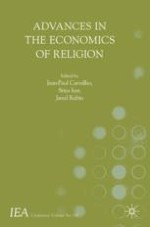2019 | OriginalPaper | Chapter
18. Religion and the European Union
Authors : Benito Arruñada, Matthias Krapf
Published in: Advances in the Economics of Religion
Publisher: Springer International Publishing
Activate our intelligent search to find suitable subject content or patents.
Select sections of text to find matching patents with Artificial Intelligence. powered by
Select sections of text to find additional relevant content using AI-assisted search. powered by
